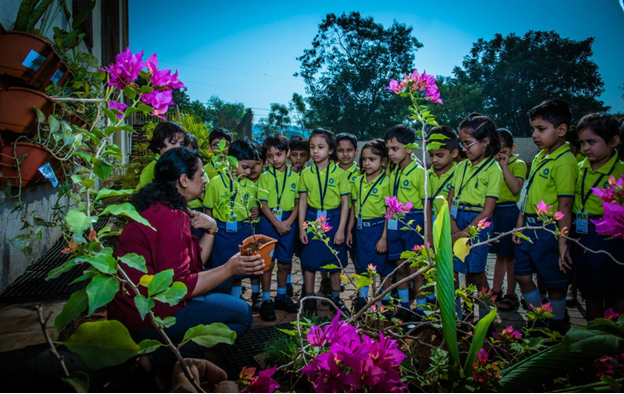Climate change is one of the most severe problems that our world is facing today. The modification of ecosystems and habitats is one of the most visible results. Numerous kinds of animals and plants are trying to adapt to a fast changing environment. While other species may be more vulnerable to disappearance, certain specie’s geographic ranges could change as a result of global warming.
We all knew that the melting of glaciers and ice caps causes rising sea levels. This disturbs the delicate balance of arctic ecosystems. The survival of Polar bears, seals, and penguins is endangered as they depend on sea ice for hunting, reproducing, and resting.
We are often hearing about the news of Heatwaves, droughts, hurricanes, and floods, resulting in death tolls, infrastructure damage, and forced migration. These natural disasters also have long term consequences for agriculture, water supply, and general food security.
Environmental learning is important in understanding that the above mentioned effects are linked and have significant consequences for both the environment and human societies. To fight against the effects of climate change the younger generation should be aware of types of Environmental education and its importance.
At the end of the sixties, environmental education developed as a response to increasing environmental issues. With the creation of Earth Day and the formation of environmental organizations around the start of the twentieth century, it gathered traction. It has now grown to involve several methods for engaging individuals and communities in environmental care.
Need of Environmental Education
If one wants to learn about nature in an effective way, Environmental education is the answer. It’s all about understanding how everything in our environment is linked and how our simple day to day activities can affect the Earth. Environmental learning teaches children about the importance of nature, biodiversity, and livable. Here are some key points about the need for Environmental education.
Additionally, many of the best schools in Pune prioritize environmental education as a vital component of their curriculum, instilling in students a deep understanding of ecological interconnectedness and fostering a sense of responsibility towards preserving the planet for future generations. Through hands-on experiences and engaging lessons, these schools empower students to become stewards of the environment and advocates for sustainable practices.
Awareness
Environmental education improves the general understanding of worries such as pollution, deforestation, and climate change. It teaches youngsters about the effects of human activity on the environment.
Appreciation for Nature
By learning about the environment, kids develop a huge appreciation for nature and its beauty. They discover the value of plants, animals, and environments and the significance of maintaining them.
Stewardship
Environmental education instills a sense of responsibility and stewardship in children. They learn that everyone has a role to play in environmental protection and making responsible decisions to ensure a brighter future.
Critical Thinking
It develops critical thinking abilities by educating children to analyze environmental issues and suggest innovative solutions. They learn to think about the effects of their actions and to make useful decisions.
Connection to the Outdoors
Environmental education promotes outdoor activities and hands-on experiences in nature. Children have the chance to discover and communicate with their natural surroundings.
Health and Well-being
Kids who engage in environmental education often develop healthier habits and they can understand the value of clean air, water, and food, and how these things help to their overall health and happiness.
Empathy and Compassion
Environmental education helps children develop empathy and compassion towards living beings.
Role of Parents and Teachers in Environment Education
Parents and teachers can lead by example by practising environmentally friendly behaviours. Children are more likely to imitate similar behaviours when they observe their parents and teachers reuse and recycle, conserve energy, or decrease garbage.
They can provide information and raise awareness about environmental issues. They can teach children about the value of nature, conservation, and environmentally friendly practises through dialogues, books, videos, and field excursions.
Parents and teachers can encourage kids to explore and experience nature first hand. They can take them on nature walks, park visits, and other outdoor activities to help kids connect with and appreciate the natural world.
Real-world experiences that allow children to actively participate in environmental projects can be facilitated by parents and instructors. This can involve gardening, composting, recycling, and taking part in community clean up programs. In many of the best schools in Bengaluru like Euroschool, the school pedagogy is built to move fluidly between indoor and outdoor environments for better student learning engagement. Together with top-notch sports facilities and a number of other amenities, the majority of the indoor classrooms are also built with views of the verdant natural environments.
They are able to help children to develop critical thinking skills by talking about environmental issues and encouraging them to make smart decisions. They can encourage questions, research, and exploration to develop their problem solving abilities.
Parents and teachers can develop tolerance and promote values of environmental care and respect. They can educate children about the connection of all living things and the impact of their behaviour on the environment and others.
They can motivate children to work together on environmental issues with their classmates, groups, and neighbourhood organisations. They may inspire children to take action and become supporters of the environment through projects, campaigns, and participation in environmental causes.
Types of Environmental Education
Classroom-based education
Traditional forms of environmental education delivered through lectures, presentations, and discussions in schools or educational institutions.
Field trips and outdoor activities
Practical learning experiences that take students outside the classroom to observe and interact with the natural environment.
Nature-based education
Nature based learning emphasises hands-on experiences in natural settings, allowing learners to explore and discover the environment first hand. Many of the best schools in Hyderabad prioritise such experiential learning opportunities, recognising their significant role in fostering a deeper understanding and appreciation for nature among students.
Citizen science projects
Engages individuals in scientific research, collecting data and contributing to environmental monitoring and conservation efforts.
Experiential learning
Encourages active participation and direct engagement with environmental issues, promoting problem-solving skills and critical thinking.
Eco-schools and environmental clubs
Promotes environmental awareness and action within schools through initiatives such as recycling programs and sustainable practices.
Environmental campaigns and advocacy
Raises awareness about specific environmental issues and encourages individuals to take action and support environmental causes.
Online and digital resources
Utilizes technology to provide accessible and interactive environmental education materials, including videos, online courses, and interactive platforms. In fact, many of the top schools in Mumbai recognise the importance of incorporating such technological resources into their curriculum, ensuring that students have engaging and effective tools to learn about environmental issues and solutions.
Community outreach programs
Engages local communities in environmental education through workshops, events, and collaborative projects.
Environmental preservation program
Encourages people to care for the environment by doing things like planting trees and restoring ecosystems, which develops a sense of responsibility and action.
Conclusion
At EuroSchool , we understand that environmental education is important in educating students with the information to build perspectives, and skills needed to conserve th e environment. We create the path for an improved greener future by building a connection to nature, encouraging creativity, and supporting environmental protocols. Our school in Bannerghatta is a nature-inspired school set amidst lush green land and designed to seamlessly transition between indoors and outdoors for better learning engagement with students. Check out our school admission process and enrol your child soon!










